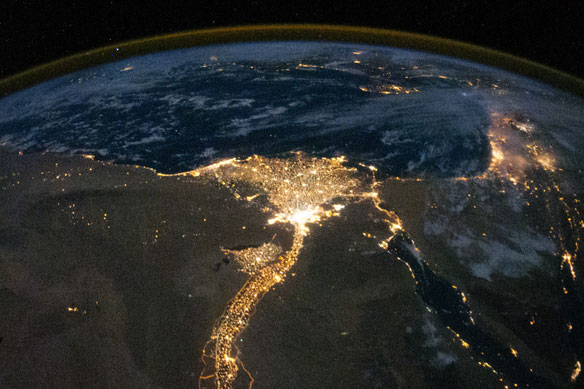Save the Nile Delta, President Sisi
By Khaled Diab
Egypt would be much better off saving the sinking ship of the Nile Delta instead of building a white elephant Suez Canal II.

Thursday 18 September 2014
Egyptian presidents have long been fond of symbolic mega-projects. In addition to the practical benefits they were expected to perform, these show-pieces had the dual purpose of demonstrating how apparently visionary the dictator of the moment was, his patriotism and benign influence, as well as a tool for cobbling together a semblance of national unity and purpose.
Gamal Abdel-Nasser had the Aswan High Dam, which was intended to electrify the public towards his ambitious Arab socialist development programme. However, disagreement over financing prompted him, in 1956, to nationalise the Suez Canal to pay for the dam, leading to war with Britain, France and Israel. Anwar al-Sadat's mega-project was to cross the Suez Canal militarily to regain the Sinai territory Egypt lost to Israel in 1967, and defeat not only Egypt's neighbouring enemy but also to silence his domestic ones.
Hosni Mubarak had his Toshka project which was meant to create a new Nile Valley to absorb some of the country's runaway population growth and the alarming loss of arable land to urban development. Toskha would achieve this by diverting water from Lake Nasser into the desert with the aim of expanding Egypt's agricultural acerage by 10%. Despite its noble ambitions, “Mubarak's pyramid”, as this largely aborted super mega-project was described, has only delivered a molehill due to mismanagement and poor planning.
Only a few months into his presidency, Abdel-Fattah al-Sisi has already broken ground on his own mega-project, billed not as the new Nile Valley but as the new Suez Canal. While Nasser nationalised the Suez Canal and Sadat's army crossed it, Sisi's ambition is to expand the waterway by building a second, 72km-long channel that is expected to boost the traffic passing through Suez. The project also fits into the government's ambition to transform the Suez region into an industrial, technological and international trading hub.
But this poorly conceived project is already smashing against the rocks of unexpected problems. On a fundamental level, some experts wonder whether the extension will actually boost the Canal's capacity, since more than 90km of the waterway will remain single-carriage. In addition, there may simply not been enough additional demand from shipping to justify the new investment.
On top of that, the project has already run into expensive technical complications. Ignoring warnings by irrigation experts, the digging began too close to the original Canal which has caused the site to fill with groundwater. Pumping the excess water out carries a price tag of $1 million per day.
It is my view that, rather than yet another white elephant mega-project, Egypt would be much better off diverting the estimated $8.4 billion it will cost to build Suez Canal II to another, far more pressing mega-project: Nile Delta I.
Since ancient times, the Nile Delta, which covers 25,000 square kilometres and houses nearly half of Egypt's population, has been the national breadbasket but also that of various empires. Yet this extremely fertile fan of land in the middle of the desert is under serious threat from a two-pronged attack: rising sea levels caused by global warming and sinking sediment due to the silt being blocked upstream by the Aswan High Dam.
The Delta is quite literally sinking into the sea, but few officials seem unduly alarmed by this impending shipwreck. Despite the economic, social and national security implications of this catastrophe-in-the-making, no Egyptian government has taken any substantial action to beat back this erosion, aside from constructing a few measly dykes and barriers to protect important urban areas on the coast.
This is doubly surprising in light of the decades of forewarnings provided by both local and international experts. For example, more than a quarter of a century ago, researchers at the Smithsonian Institute delivered dire warnings about future disaster.
Today, the alarm amongst experts has reached fever pitch. “The total [area of the Delta] expected to be impacted by a rising of the sea level by one metre during this century will be 8,033 square kilometres, which is nearly 33% of the total area of the Nile Delta,” predicted Khaled Ouda, a geologist at Egypt's Assiut University, in an interview with Al Jazeera earlier this year.
In addition to the loss of precious agricultural land, this would turn millions of people in one of the most densely populated places on Earth climate refugees.
Given that rising sea levels and a sinking delta would redraw Egypt's natural map more radically than ISIS has redrawn Iraq and Syria's political one, the price of averting this disaster is surprisingly low – less than half al-Sisi's Suez Canal project.
A plan proposed by Egyptian engineer Mamdouh Hamza involves the construction of a concrete wall along the Delta's entire coastline and skirting it with a plastic diaphragm to prevent saltwater seepage. Total estimated cost: just $3 billion. The remaining billions can be invested in building impenetrable barriers several metres below sea level to hold the crumbling Delta in place and avoid sea water salinating the Delta's aquifer.
Beyond these emergency measures, Egypt needs innovative solutions to replenish the Nile Delta through restoring the flow of natural silt, which not only protects against sea erosion but also acts as a powerful natural fertiliser. But this is more easily said than done, since the silt is sitting at the bottom of Lake Nasser a thousand kilometres downstream.
Inaction on these fronts will make the fallout from the revolutions and counterrevolutions that have gripped Egypt since 2011 seem like a minor distraction. Failing to protect the gift that is the Delta will turn the Nile into a curse for Egypt.
____
Follow Khaled Diab on Twitter.
This article first appeared in The National on 8 September 2014.


